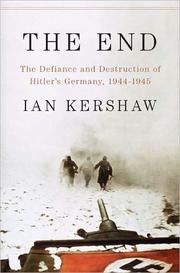Check nearby libraries
Buy this book

"From the preeminent Hitler biographer, a fascinating and original exploration of how the Third Reich was willing and able to fight to the bitter end of World War II. Countless books have been written about why Nazi Germany lost World War II, yet remarkably little attention has been paid to the equally vital question of how and why it was able to hold out as long as it did. The Third Reich did not surrender until Germany had been left in ruins and almost completely occupied. Even in the near-apocalyptic final months, when the war was plainly lost, the Nazis refused to sue for peace. Historically, this is extremely rare. Drawing on original testimony from ordinary Germans and arch-Nazis alike, award-winning historian Ian Kershaw explores this fascinating question in a gripping and focused narrative that begins with the failed bomb plot in July 1944 and ends with the German capitulation in May 1945. Hitler, desperate to avoid a repeat of the "disgraceful" German surrender in 1918, was of course critical to the Third Reich's fanatical determination, but his power was sustained only because those below him were unable, or unwilling, to challenge it. Even as the military situation grew increasingly hopeless, Wehrmacht generals fought on, their orders largely obeyed, and the regime continued its ruthless persecution of Jews, prisoners, and foreign workers. Beneath the hail of allied bombing, German society maintained some semblance of normalcy in the very last months of the war. The Berlin Philharmonic even performed on April 12, 1945, less than three weeks before Hitler's suicide. As Kershaw shows, the structure of Hitler's "charismatic rule" created a powerful negative bond between him and the Nazi leadership- they had no future without him, and so their fates were inextricably tied. Terror also helped the Third Reich maintain its grip on power as the regime began to wage war not only on its ideologically defined enemies but also on the German people themselves. Yet even as each month brought fresh horrors for civilians, popular support for the regime remained linked to a patriotic support of Germany and a terrible fear of the enemy closing in. Based on prodigious new research, Kershaw's The End is a harrowing yet enthralling portrait of the Third Reich in its last desperate gasps. "--
Check nearby libraries
Buy this book

Previews available in: English
Subjects
Public opinion, Military leadership, World War, 1939-1945, Military Sociology, HISTORY / Europe / Germany, History, New York Times reviewed, HISTORY, Germany, Command of troops, Weltkrieg, Nationalsozialismus, Herrschaft, Öffentliche Meinung, Kriegsende, Social aspects, Andra världskriget 1939-1945, Militärsociologi, Militärt ledarskap, BMBF-Statusseminar gnd, Hitler, adolf, 1889-1945, World war, 1939-1945, germany, Sociology, military, Germany, history, 1933-1945People
Adolf Hitler (1889-1945)Places
GermanyTimes
20th centuryShowing 2 featured editions. View all 2 editions?
| Edition | Availability |
|---|---|
|
1
The End: The Defiance and Destruction of Hitler's Germany, 1944-1945
Aug 28, 2012, Penguin Books
paperback
0143122134 9780143122135
|
zzzz
Libraries near you:
WorldCat
|
|
2
The end: the defiance and destruction of Hitler's Germany, 1944-1945
2011, Penguin Press
Hardcover
in English
1594203148 9781594203145
|
aaaa
Libraries near you:
WorldCat
|
Book Details
Published in
New York
Table of Contents
Edition Notes
Includes bibliographical references and index.
Classifications
External Links
The Physical Object
ID Numbers
Work Description
The last months of the Second World War were a nightmarish time to be alive. Unimaginable levels of violence destroyed entire cities. Millions died or were dispossessed. By all kinds of criteria it was the end: the end of the Third Reich and its terrible empire but also, increasingly, it seemed to be the end of European civilization itself. In his gripping, revelatory new book Ian Kershaw describes these final months, from the failed attempt to assassinate Hitler in July 1944 to the German surrender in May 1945. The major question that Kershaw attempts to answer is: what made Germany keep on fighting? In almost every major war there has come a point where defeat has loomed for one side and its rulers have cut a deal with the victors, if only in an attempt to save their own skins. In Hitler's Germany, nothing of this kind happened: in the end the regime had to be stamped out town by town with a level of brutality almost without precedent. As the Allies closed in on every front extraordinary efforts were made by Hitler and his key 'paladins' to keep fighting way beyond the point where any rational plan for victory had vanished. A system based on terror, which had for years ravaged the countries conquered by the Nazis, was now visited on the Germans themselves. Both a highly original piece of research and a gripping narrative, The End makes vivid an era which still deeply scars Europe. It raises the most profound questions about the nature of the Second World War, about the Third Reich and about how ordinary people behave in extreme circumstances. - Publisher.
Links outside Open Library
Community Reviews (0)
Feedback?History
- Created October 23, 2011
- 16 revisions
Wikipedia citation
×CloseCopy and paste this code into your Wikipedia page. Need help?
| March 7, 2023 | Edited by MARC Bot | import existing book |
| December 17, 2022 | Edited by ImportBot | import existing book |
| January 1, 2022 | Edited by ImportBot | import existing book |
| September 25, 2020 | Edited by MARC Bot | import existing book |
| October 23, 2011 | Created by LC Bot | Imported from Library of Congress MARC record. |















